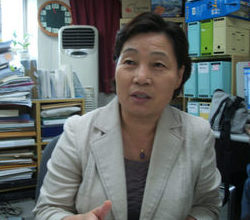Posted on : Jul.19,2006 10:52 KST
Modified on : Jul.20,2006 10:52 KST
Forced into labor during World War II, father is enshrined at Yasukuni
In February 1944, when Lee Hee-ja turned one, her father, Lee Sa-hyun, was forcibly conscripted into labor by Japan, then still the colonial ruler of Korea. A year-and-a-half later, Korea was liberated, but Lee’s father did not return home. Lee Hee-ja would never see her father again.
She was so young when her father was taken away, Lee Hee-ja cannot not remember her father’s face. However, Lee, who will turn 61 this year, has filed a lawsuit to retrieve her father’s memorial tablet, enshrined at Yasukuni in Japan.
The shrine has been subject to fierce criticism by China, South Korea and the international community, as it honors Japanese war criminals and has seen repeated visits by Japanese prime minister Junichiro Koizumi. Besides Japanese war dead, the remains of thousands of Chinese, Taiwanese, and Koreans who died under forced servitude are enshrined there.
On July 14, the Hankyoreh met Lee, who also heads the South Korean branch of Joint Action against Yasukuni, formed by civic groups in South Korea, Taiwan, and Japan. Lee is one of co-heads of The Committee for Compensation for Victims from the Pacific War.
"At first, I started to search for the details of my father’s death. In 1997, I found a record stating that my father’s remains were honored at the Yasukuni shrine. I can’t believe this. [The Japanese government] didn’t notify me about my father’s death and his remains were honored at Yasukuni...I was so resentful."
Since making this discovery, Lee has searched for records in South Korea and Japan so that she could file a lawsuit, finally doing so in 2001. The trial was aimed at questioning to what extent Japan would compensate Koreans forced to work during World War II.
However, the suit was thrown out by a Tokyo district court last May. Lee is now preparing for an appeal.
"So far, the suit has been filed against the Japanese government. I will file a suit against the Yasukuni shrine in the future," Lee said.
Since last year, Lee had pledged to form an alliance against the Yasukuni shrine, touring Taiwan and Japan and publicizing her cause. Joint Action against Yasukuni represents the results of her efforts. Besides victims’ families, academic, religious, and civic groups form part of the coalition, Lee said.
On July 20 and 21, Joint Action against Yasukuni will hold a symposium in Seoul under the subject, "see Yasukuni in the eyes of the world." In April, the committee plans to stage candlelight vigils in Japan to protest Prime Minister Koizumi’s visits to the shrine. In 2007, the group plans to file a complaint with the humanitarian executive board at the United Nations.

